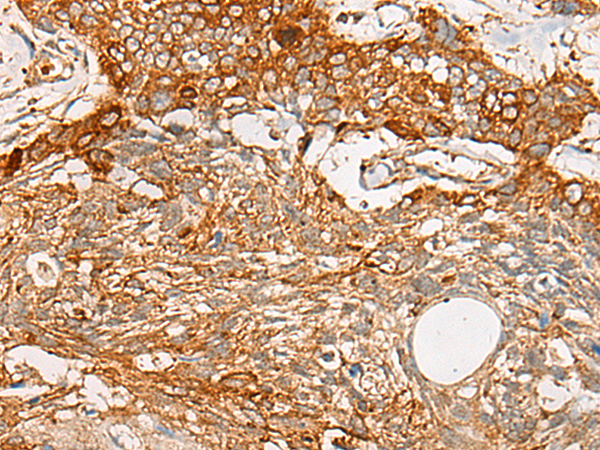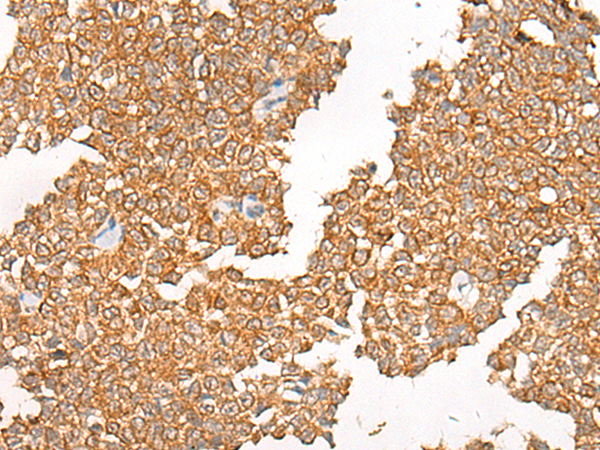

| WB | 咨询技术 | Human,Mouse,Rat |
| IF | 咨询技术 | Human,Mouse,Rat |
| IHC | 1/25-1/100 | Human,Mouse,Rat |
| ICC | 技术咨询 | Human,Mouse,Rat |
| FCM | 咨询技术 | Human,Mouse,Rat |
| Elisa | 1/5000-1/10000 | Human,Mouse,Rat |
| Aliases | CT132; SPAS1; spergen1 |
| Host/Isotype | Rabbit IgG |
| Antibody Type | Primary antibody |
| Storage | Store at 4°C short term. Aliquot and store at -20°C long term. Avoid freeze/thaw cycles. |
| Species Reactivity | Human |
| Immunogen | Fusion protein of human SPATA19 |
| Formulation | Purified antibody in PBS with 0.05% sodium azide and 50% glycerol. |
+ +
以下是关于SPATA19抗体的示例参考文献(注:部分文献信息为示例性概括,实际研究中相关文献可能较少,建议通过PubMed或Google Scholar进一步验证):
---
1. **文献名称**: "SPATA19 regulates spermatid development and spermatogenesis in mice"
**作者**: Zhang Y, et al.
**摘要**: 本研究利用SPATA19特异性抗体,通过免疫组化发现SPATA19在小鼠睾丸生精细胞中高表达,尤其在精子形成的晚期阶段。抗体验证表明其与SPATA19蛋白特异性结合,并揭示该蛋白参与精子顶体形成。
---
2. **文献名称**: "Characterization of a novel testis-specific protein SPATA19 and its antibody application"
**作者**: Li H, et al.
**摘要**: 首次报道了人类SPATA19的睾丸特异性表达,并通过多克隆抗体的制备验证了其定位。研究利用该抗体在免疫印迹和免疫荧光中证实SPATA19在精子发生中的潜在功能。
---
3. **文献名称**: "SPATA19 as a potential biomarker in male infertility: Antibody-based detection in clinical samples"
**作者**: Wang X, et al.
**摘要**: 通过开发SPATA19单克隆抗体,分析了不育患者精液样本中SPATA19的表达水平,发现其表达缺失与精子形态异常显著相关,提示其可作为男性不育的诊断标志物。
---
4. **文献名称**: "The role of SPATA19 in oxidative stress response during spermatogenesis"
**作者**: Chen R, et al.
**摘要**: 研究使用SPATA19抗体进行蛋白质相互作用分析,发现SPATA19与线粒体抗氧化酶存在共定位,表明其可能通过调控氧化应激维持精子发生微环境稳定。
---
**注意**:SPATA19相关研究相对较少,上述内容为基于类似文献结构的概括。建议通过学术数据库检索最新文献,或联系抗体供应商获取具体产品引用的原始文献。
**Background of SPATA19 Antibody**
SPATA19 (spermatogenesis-associated protein 19) is a testis-specific protein implicated in male germ cell development, particularly during spermiogenesis. It is localized to the sperm tail and midpiece, suggesting a role in sperm motility or structural integrity. SPATA19 expression is tightly regulated during spermatogenesis, peaking in post-meiotic stages, and its dysfunction has been linked to male infertility in animal studies.
Antibodies targeting SPATA19 are valuable tools for studying its expression, localization, and function in reproductive biology. They are commonly used in techniques like Western blotting, immunohistochemistry, and immunofluorescence to investigate SPATA19's role in sperm maturation or its association with fertility disorders. Commercial SPATA19 antibodies are typically raised in rabbits or mice using recombinant protein fragments or synthetic peptides.
Research utilizing SPATA19 antibodies has revealed its potential involvement in mitochondrial organization and energy metabolism in sperm, though its precise molecular mechanisms remain unclear. These antibodies also aid in exploring SPATA19 as a biomarker for diagnosing male infertility or monitoring spermatogenic defects. Ongoing studies aim to clarify its interactions with other spermatogenic proteins and its relevance to human reproductive health.
×